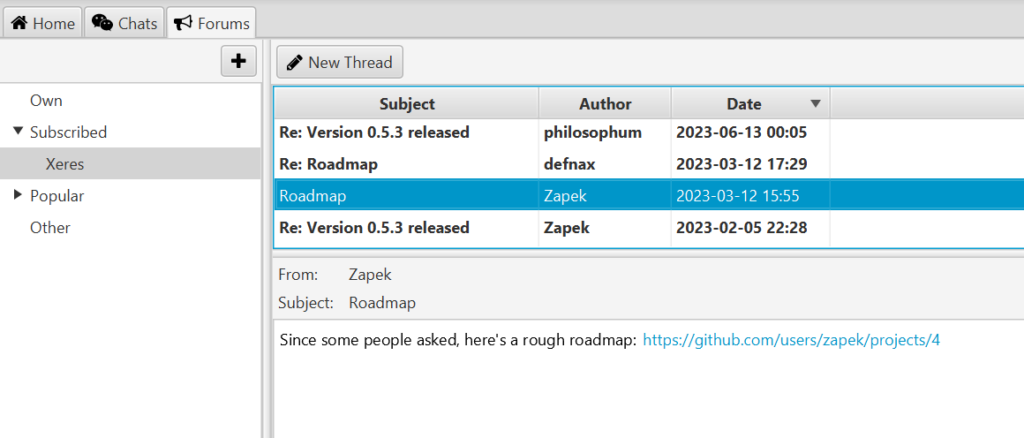This version contains a brand new user interface which is modern and adds a dark mode.
Download here.
Screenshots here.
Note that the MacOS version has been removed. The explanation is here.
And of course, the JDK used to build the release was busted, which would make the profile creation fail. And due to the way the packaging is performed, it would only fail in that state, and not during the tests, conclusion:
Download here
And the previous post with a description of all feature is here.
After a long wait, a new version with some major changes:
You can now communicate using forums and instant synchronization. Subscribe to your favorite topics and participate in conversations with other users.

It also features a markdown editor so you can have some structure and style but without the bloat of HTML.

which gives the following result once the message is sent:

Incoming HTML messages from Retroshare are automatically converted to markdown.
Emojis up to Unicode version 14 are supported inline and with colors:

You can now export your own profile, location and identity as well as your friend’s profiles and locations to an XML file for backup purposes.
This is also useful when switching versions with incompatible databases (*).
*: Upgrading from a previous version requires deleting the profile because of some major changes again. At least from this version on there’s the profile export/import feature to mitigate this in the future.
This is mostly a bugfix release but it also contains a new useful feature: QR code support to exchange IDs.

You can save it as an image (for example to display on a phone) or simply print it. To import it, go to Add Peer… / Scan a QR code and just hold it in front of your webcam (yes, Xeres supports webcams now).
Other notable bug fixes are:
And many bug fixes and other improvements.
Download from GitHub.
This release contains quite some important features:
Support for Tor and I2p.

Which means you can connect to Tor and I2P peers.
And support for the DHT.
Which means you can connect to other Xeres/Retroshare peers even if you don’t know their IPs.
There’s a lot of cool new UI features, especially the settings part where you can configure all the above and also control UPNP and Broadcast Discovery.
There’s also the (in)famous LEDs in the status bar 🙂

Here’s the list of changes:
And many bug fixes and other improvements.
Head over to Github to download it.
Finally a new release!
This release was focusing on fixing many bugs regarding the GxS syncing, many parts have been rewritten and it’s now faster and more reliable.
The chat UI has been refined too. Xeres can be used as a daily chat system.
I also upgraded to the latest H2, which is unfortunately not backward compatible. This means you have to delete your user data and recreate a profile. Sorry! From now on I’ll be more careful when upgrading and provide an automated path.
List of changes:
And many bug fixes and other improvements.
Head over to Github to download it.
New release!
Contains many performance improvements as well as private chat rooms support.
There’s also a JAR version which is supposed to run on Linux ARM64 and OSX ARM64 too. Since I don’t have the hardware to test, your feedback is welcome.
Update: the JAR doesn’t seems to work. Missing JavaFX native libraries for some reasons. Use the installer instead.
List of changes:
Head over to Github to download it.
Finally a new release!
I now switched to Github Actions, which means it’s easier to build and as a bonus there’s now a MacOS version (but see here).
Here’s the list of changes:
Chat UI improvements
General UI improvements
Protocol improvements
And many bug fixes and other improvements.
Head over to Github to download it.